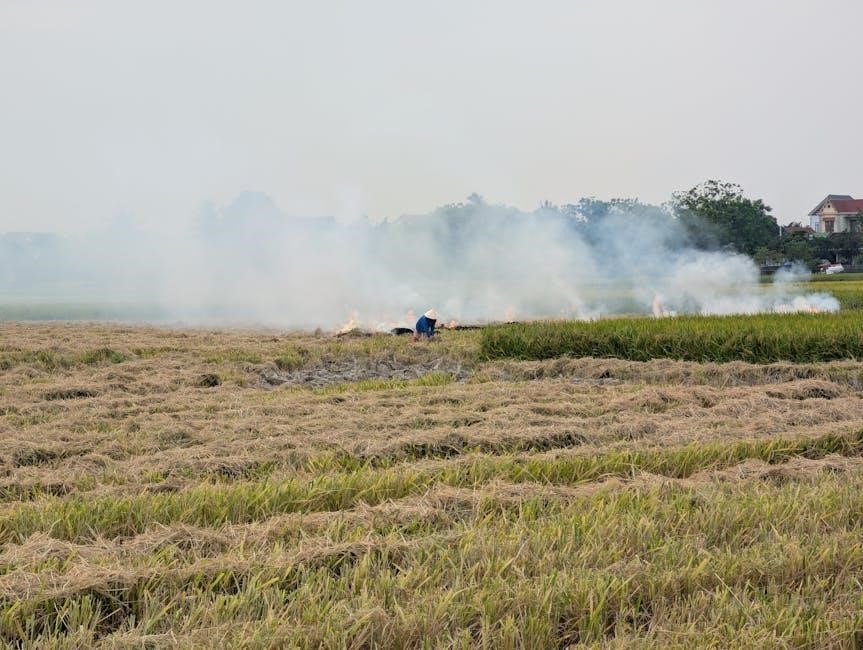The Story of the Chinese Farmer‚ rooted in ancient Taoist wisdom‚ illustrates life’s uncertainties through a farmer’s experiences. Popularized by Alan Watts‚ it teaches acceptance of life’s unpredictable nature.
Background and Context
The Story of the Chinese Farmer is rooted in ancient Taoist philosophy‚ emphasizing acceptance of life’s unpredictability. Originating from the Huainanzi‚ a 2nd-century B.C. text‚ the parable has evolved over centuries‚ gaining global recognition through interpretations by thinkers like Alan Watts. It reflects Taoist teachings on non-judgment and resilience‚ offering timeless wisdom for navigating life’s challenges. The story’s enduring relevance lies in its universal message of adapting to change with a neutral mindset.
Relevance of the Story in Modern Times
The Story of the Chinese Farmer remains highly relevant today‚ offering timeless wisdom on navigating life’s unpredictability. In a fast-paced‚ stress-filled world‚ its message of non-judgment and acceptance resonates deeply. It encourages individuals to embrace uncertainty‚ fostering mental well-being and resilience. The parable’s universal themes of adaptability and neutrality continue to inspire modern audiences‚ making it a valuable tool for personal growth and philosophical reflection in contemporary society.

The Origin of the Parable
The parable originates from the ancient Chinese text Huainanzi‚ dating back to the 2nd century B.C. It was later popularized by philosopher Alan Watts.
Huainanzi: The Ancient Chinese Text
The Huainanzi‚ a foundational Taoist text from the 2nd century B.C.‚ is the source of the parable. Compiled during the Han Dynasty‚ it explores themes of natural order‚ balance‚ and the interconnectedness of life. The story of the Chinese farmer‚ found within its teachings‚ reflects Taoist wisdom‚ emphasizing the unpredictability of events and the futility of labeling them as good or bad. This text remains a cornerstone of Chinese philosophy.
Evolution of the Story Over Time
The story of the Chinese farmer has evolved significantly since its origins in the Huainanzi. Over centuries‚ it has been adapted into various forms‚ including fables and parables‚ while retaining its core message. Popularized by philosophers like Alan Watts‚ it has reached global audiences‚ inspiring interpretations in psychology and modern philosophy. Its timeless wisdom continues to resonate‚ making it a universal tale of life’s unpredictability and the importance of neutrality in the face of change.
The Main Narrative of the Story
A Chinese farmer’s horse runs away‚ prompting neighbors to offer condolences. The horse returns with another‚ bringing unexpected fortune. The farmer remains neutral‚ embodying acceptance of life’s unpredictability.
The Farmer‚ the Horse‚ and the Neighbors
A Chinese farmer’s horse runs away‚ and neighbors gather to express sympathy‚ believing it a disaster. The farmer‚ however‚ remains indifferent‚ understanding life’s unpredictability. His calm response reflects Taoist wisdom‚ emphasizing acceptance over judgment. The story highlights how external events‚ whether perceived as good or bad‚ are interconnected and beyond individual control‚ teaching resilience and neutrality in the face of life’s challenges.
The Farmer’s Response to Adversity
The Chinese farmer’s response to losing his horse was one of calm neutrality. When neighbors offered condolences‚ he replied‚ “Good news‚ bad news‚ who can say?” This reflected his Taoist belief in accepting life’s unpredictability without judgment. Even when the horse returned with more horses‚ he remained indifferent‚ understanding the interconnectedness of events. His response embodies resilience and the wisdom of not labeling events as solely good or bad‚ teaching us to embrace life’s uncertainty with equanimity.
Key Themes and Philosophical Insights
The story highlights themes of uncertainty‚ interconnectedness‚ and non-judgment‚ encouraging a neutral mindset toward life’s unpredictable events and fostering resilience in the face of adversity.
The Uncertainty of Life and the Nature of Reality
The story underscores the unpredictable nature of life‚ where events defy simplistic labels of good or bad. Rooted in Taoist philosophy‚ it reveals reality as complex and interconnected‚ emphasizing that outcomes often unfold in unforeseen ways. The farmer’s neutral response to losing and regaining his horse illustrates this‚ teaching us to embrace life’s unpredictability without judgment‚ aligning with the Taoist view of reality as a fluid‚ ever-changing process.
The Interconnectedness of Events
This timeless tale highlights how life’s events are deeply intertwined‚ often unfolding in ways beyond our comprehension. The farmer’s experience with the horse and his son reveals a complex web of causality‚ where loss and gain are relative. The story teaches us that no event exists in isolation‚ and what seems unfortunate may lead to unexpected benefits‚ while what appears fortunate may conceal future challenges‚ embodying the Taoist view of life’s inherent interconnectedness.

Alan Watts and the Interpretation of the Story
Alan Watts popularized the tale‚ using it to illustrate Taoist wisdom about non-judgment and acceptance of life’s unpredictability‚ emphasizing the farmer’s neutral response to changing fortunes.
Watts’ Perspective on Taoism and the Farmer’s Wisdom
Alan Watts interpreted the story through a Taoist lens‚ emphasizing the farmer’s neutrality amid life’s unpredictability. He highlighted the Taoist principle of non-judgment‚ illustrating how labeling events as good or bad limits our understanding. Watts argued that true wisdom lies in accepting the natural flow of life‚ as the farmer exemplified by not resisting change. This perspective fosters resilience and harmony with life’s inherent unpredictability‚ aligning with Taoist teachings on balance and harmony.
The Role of Acceptance in the Face of Uncertainty
The story underscores the power of acceptance in navigating life’s unpredictability. The farmer’s neutral response to events teaches us to avoid labeling circumstances as good or bad. This acceptance allows us to adapt naturally to change‚ aligning with the Taoist principle of flowing with life’s rhythm. By embracing uncertainty without resistance‚ we find peace and reduce suffering‚ as the farmer’s story so eloquently illustrates.
Cultural and Historical Significance
The story‚ rooted in Taoist philosophy‚ reflects ancient Chinese wisdom‚ appearing in texts like the Huainanzi. Its timeless lessons on uncertainty and balance remain influential today.
Taoist Teachings and Their Influence
The story embodies Taoist principles‚ emphasizing acceptance of life’s flow and non-judgment of events. Rooted in the Huainanzi‚ it illustrates wu-wei‚ or effortless action‚ and the balance of yin-yang. These teachings encourage harmony with nature and detachment from outcomes. The farmer’s neutral response to fortune and misfortune reflects Taoist wisdom‚ influencing thought and behavior by promoting resilience and equilibrium in an unpredictable world.
The Story as a Metaphor for Life’s Challenges
The story serves as a powerful metaphor for life’s unpredictable nature. The farmer’s experiences with losing and regaining the horse‚ followed by his son’s injury‚ illustrate how events are interconnected and can shift from seeming good to bad and vice versa. By maintaining a neutral perspective‚ the farmer embodies resilience and adaptability‚ offering a timeless lesson in navigating life’s challenges without making hasty judgments.

Modern Relevance of the Story
The story’s timeless wisdom about uncertainty and interconnected events resonates deeply in today’s fast-paced‚ unpredictable world‚ offering insights into navigating life’s challenges with acceptance and balance.
Applying the Farmer’s Philosophy to Everyday Life
The farmer’s story encourages us to embrace life’s unpredictability with neutrality and resilience. By refraining from labeling events as good or bad‚ we reduce stress and anxiety. This mindset fosters adaptability‚ allowing us to navigate challenges more effectively. Alan Watts emphasized that accepting life’s flow cultivates inner peace and clarity. Applying this philosophy helps individuals make decisions without attachment to outcomes‚ promoting emotional well-being and harmony in personal and professional relationships.
The Story’s Impact on Psychology and Well-being
The Story of the Chinese Farmer profoundly impacts psychology and well-being by teaching acceptance of life’s uncertainties. It reduces anxiety and fear by discouraging labels of good or bad. This mindset fosters emotional balance and resilience‚ aligning with mindfulness practices. By embracing the flow of life‚ individuals cultivate mental clarity and inner peace‚ enhancing overall well-being and harmony.
Moral and Ethical Lessons
The story teaches us to avoid preconceived notions about events‚ embracing life’s unpredictability. It highlights the importance of resilience and neutrality‚ fostering inner peace and wisdom.
The Danger of Judging Events as Good or Bad
The story underscores the futility of labeling events as good or bad‚ as life’s outcomes are interconnected and unpredictable. The farmer’s neutrality amidst changing fortunes highlights how judgment can obscure reality. By avoiding rigid classifications‚ we embrace the fluidity of existence‚ fostering mindfulness and resilience. This wisdom‚ rooted in Taoist philosophy‚ encourages us to observe life without attachment‚ recognizing that what seems unfortunate may lead to unexpected benefits.
The Importance of Neutrality and Resilience
The farmer’s calm demeanor amidst shifting fortunes exemplifies the value of neutrality and resilience. By not overreacting to loss or gain‚ he avoids emotional turmoil‚ showing that true strength lies in adaptability. This approach fosters a balanced perspective‚ enabling us to navigate life’s unpredictability with grace. Neutrality and resilience are not about detachment but about embracing change with equanimity‚ a timeless lesson for coping with life’s challenges.
The story of the Chinese farmer offers timeless wisdom‚ reminding us to embrace life’s unpredictability with acceptance and resilience‚ fostering a balanced perspective that inspires enduring reflection.
Reflections on the Farmer’s Wisdom
The farmer’s wisdom lies in his non-judgmental acceptance of life’s twists‚ embodying Taoist principles of harmony with nature. His story teaches us to embrace uncertainty‚ avoiding labels of good or bad‚ and instead‚ observe life’s interconnectedness with equanimity. This timeless parable inspires reflection on resilience‚ neutrality‚ and the futility of resisting change‚ offering a profound lesson in navigating life’s unpredictable journey with grace and balance.
How the Story Continues to Inspire
The story of the Chinese farmer remains a timeless source of inspiration‚ offering insights into resilience‚ mindfulness‚ and the interconnectedness of life. It continues to influence modern philosophy‚ psychology‚ and everyday decision-making‚ reminding us to approach challenges with neutrality and acceptance. Its universal lessons transcend cultures‚ making it a cherished parable for personal growth and well-being‚ while its simplicity ensures its relevance in an ever-changing world.

Further Reading and Resources
Explore Alan Watts’ lectures‚ Huainanzi‚ and modern adaptations for deeper insights. Recommended books and online courses offer a comprehensive understanding of the farmer’s timeless wisdom.
Recommended Books and Articles
For deeper understanding‚ explore Alan Watts’ works like The Book of the Taboo Against Knowing Who You Are and Tao: The Watercourse Way; The Huainanzi‚ an ancient Chinese text‚ provides the original context of the story. Articles in the Taoist Studies Journal and essays by modern philosophers offer fresh perspectives; These resources enrich the narrative‚ blending historical depth with contemporary insights into the farmer’s timeless wisdom and its relevance today.
Online Courses and Lectures
Explore online courses and lectures that delve into the philosophy of the Chinese farmer’s story. Platforms like Coursera and Udemy offer courses on Taoism and its teachings. Alan Watts’ lectures on the story are available on YouTube and Audible‚ providing profound insights into its meaning. Additionally‚ TED Talks and podcasts often feature discussions on the story’s relevance to modern life‚ offering practical applications of its wisdom in everyday situations.
References and Citations
Primary sources include the Huainanzi‚ an ancient Chinese text‚ and modern interpretations by Alan Watts. Additional references can be found in his lectures on Audible and YouTube.
Primary Sources and Academic References
The primary source of the story is the Huainanzi‚ an ancient Chinese text from the 2nd century B.C. This text‚ attributed to Liu An‚ introduces the parable of the farmer and the horse. Academic references include translations and analyses by scholars like Alan Watts‚ whose lectures and writings popularized the story. His book The Book on the Taboo Against Knowing Who You Are and audio lectures on platforms like Audible provide deeper insights. These sources are widely available for study and reflection.
Modern Interpretations and Adaptations
The story has been reinterpreted by modern thinkers like Alan Watts‚ who emphasized its Taoist wisdom. Animated videos and audiobooks have made it accessible to a global audience. Psychologists and motivational speakers often use it to illustrate the importance of neutrality and resilience in uncertain times. This timeless parable continues to inspire people worldwide‚ offering a universal lesson on life’s unpredictability.